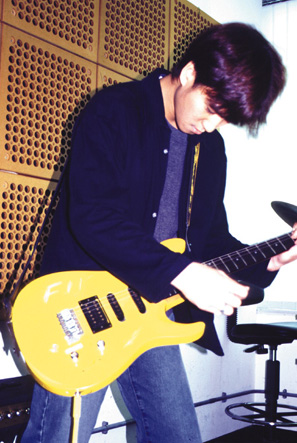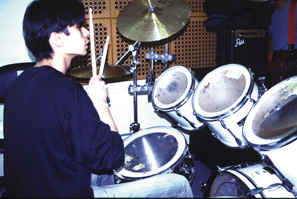 Broadening musical vistas
Broadening musical vistasBand fever is sweeping over the campuses



 Broadening musical vistas
Broadening musical vistas
Band fever is sweeping over the campuses
by Ada Sin

Playing rock ‘n’ roll music in bands is widely perceived as a subculture in Hong Kong. Bandsmen produce
loud noise when they sing, dress in the latest fashion with “in” hairstyles and tend to look a bit on the eccentric side.
In fact, rock bands’ external appearances sometimes belie their motives. Bands formed by university students pursue band music vigorously and get satisfaction from it in their own ways.
 The Commercial Radio 2 organized a programme called Rock on Campus at seven tertiary institutions between October and
December 1995. The programme aimed at promoting music in universities.
The Commercial Radio 2 organized a programme called Rock on Campus at seven tertiary institutions between October and
December 1995. The programme aimed at promoting music in universities.
Live shows of local bands and bands from China and Taiwan, live broadcasts of music by disc jockeys on campus and panel discussions about band music were the major activities. The finale of the programme saluted John Lennon of Beatles.
According to Mr. Brian Leung, music director of Commercial Radio 2, the purpose of the programme was to promote band sound, which would in turn encourage more local song composition.
“We hope to create an atmosphere of band sounds in the tertiary institutions first, and then gradually promote it to other levels,” said Mr. Leung.
He thinks that music is a mirror of society. Through it, one can learn alternative values. University students are very sensitive about society and have the greatest desire for gaining knowledge.
“In our finale,” said he, “by paying tribute to John Lennon, the Beatles’ boldness in changing the world through their songs will be highlighted. This kind of positive attitude towards life is what youngsters nowadays lack.”
Kind People is one of the campus rock bands. It was formed by five university students. Mr. Lam Chi Pong, the guitarist and a student of food and nutritional science at the University of Hong Kong, said,“Rock music is not played by ordinary people. Having been impressed by the performance of other students, we formed Kind People.”
Another university band called Sucker is formed by three Year 1 students. They found their interests in playing music together after an open performance in their secondary school days.
Mr. Leung of Commercial Radio 2 advised them to listen more to pieces from various countries other than just Cantonese songs and Taiwanese songs. This helps to widen their horizons.
“In the initial stage,” said Mr. Leung, “imitation of the Western bands is inevitable. However, they should try to explore their own styles.”
Miss Lorraine Yeung, a philosophy student at The Chinese University of Hong Kong and a member of a band named Uto, thinks that band sound is more like a form of art than pop music.
“It allows more room for creativity because our own ideas can be presented,” said Miss Yeung.
“Pop music, however, is composed so as to be in line with the taste of the audience.”
Through the music, young adults try to reveal the limitations in real life and their pessimism towards life. They think that these are shared by other young people. For example, lyrics from Sucker say:
I want to be a bird in the sky,
But I can’t fly so high in the sky.
There is no hope in reality.
Views about love affairs among teenagers are also presented. The following lyrics are from Kind People:
Love just like a TV show,
Stars sing and stars go.
Treat me like a telephone,
Push me down and U talk to others.
Playing in bands is inevitably time-consuming. Lots of time are spent on joint and individual practice sessions. As a result, study time is sacrificed.
“My study is adversely affected,” said Mr. Lam from Kind People. “I sat for the supplementary examinations last year. But my mother supports me. She thinks that playing music is a craft.”
On the other hand, Miss Yeung of Uto adopts a positive attitude towards study.
“Study helps to inspire ideas,” said she. “It helps to generate new ideas for composing songs.”
However, her relationship with her family is worsened because they cannot accept the disorder in her daily life. “I sleep in the morning and wake up at night. This contradictes with my family’s habit,” said she.
Besides, playing in bands is quite expensive. On average, each band pays about $1,500 a month in renting rooms for practice and buying musical instruments.
Besides, some of them take music lessons. “The tuition fee is $1,000 a month. This is quite a large proportion of my savings,” said Mr. Steve Tang, the drummer from Sucker, and an economics major student at Hong Kong University.
These bandsmen think their performances are far from a professional standard. Thus, they have never thought of earning a living by playing their music. Kind People said that they just want to enjoy playing music before they go to work.
Mr. Leung of the Commercial Radio 2 thinks that the lack of venues for bands to play music in open areas obstructs the development of their potential. Therefore, the station will organize more concerts for bands in the future.


